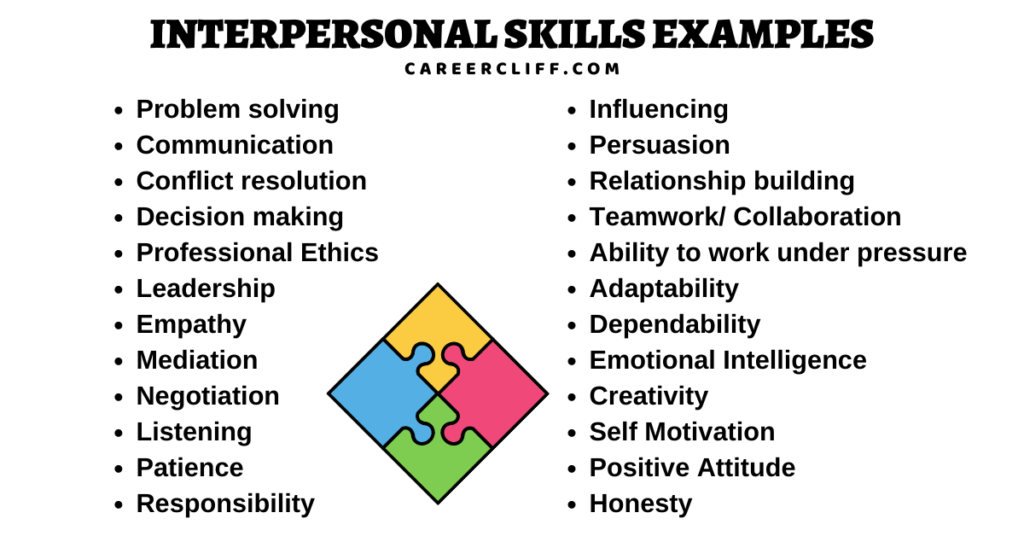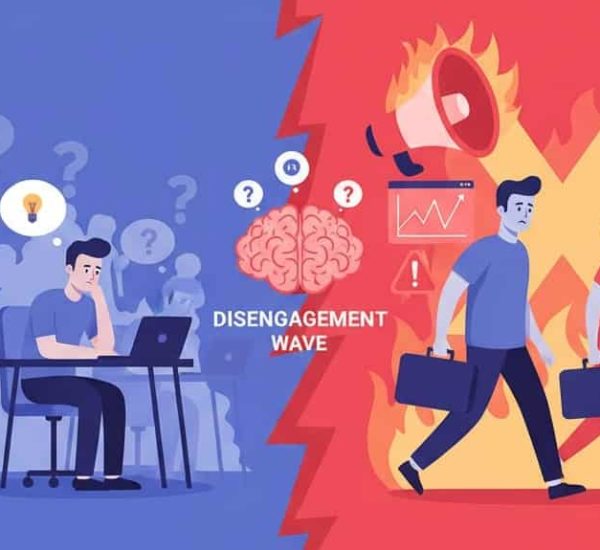Developing interpersonal skills has become an essential requirement for almost all industries. To survive in this competitive and dynamic world, one needs to build interpersonal effectiveness and communicate clearly.
Language plays a vital role in building communication skills in the workplace. However, interpersonal skills go beyond language. Several integral aspects come together to weave interpersonal effectiveness among employees.
For developing communication skills at work, employers need to pay close attention to how people around them are communicating. The organizational culture at the workplace describes how good communication helps people in a workplace.
Workplaces have become much more advanced, and employers cannot afford their workforce to be deeply introverted. An employee needs to become a “people person” and forge interpersonal relationships at work. This will help them create an impact on the organization while also building their interpersonal skills.
What are Interpersonal Skills?
Interpersonal skills define the ability to communicate with the people around you and convey the message you want them to receive. Communication skills play an important role in building the interpersonal skills of people in the organization. However, interpersonal abilities also depend on the level of confidence and empathy shown toward superiors, subordinates, and colleagues.
Interpersonal skills will aid in navigating the modern workplace by improving communication and improving transparency.
Irrespective of the skill, social listening is key to enhancing it. For the development of interpersonal skills, employees must be able to understand the type of environment they are in and actively analyze social cues.
10 Most Important Interpersonal Skills in the Workplace
Let us look at the 10 crucial interpersonal skills that employers should nurture and inculcate in their employees.

Listening
Listening is the prerequisite to learning other interpersonal skills. Only when people listen can they become good communicators and achieve interpersonal effectiveness. It is crucial to put your views forward, but it is equally important to listen to others’ opinions.
Further, comprehension becomes a significant bottleneck if people don’t listen carefully. So, you should make active listening a part of your communication skills in the workplace.
It is understandable if you cannot pay attention to everything. You must distinguish the occasions that require active listening and the ones that need passive listening. Only when employers listen can they effectively respond to what the speaker is saying and build a healthy organizational environment.
Clarity and Concision
For employers to create an environment conducive to developing strong interpersonal skills, it is imperative to have clarity and concision. While verbosity can be good during interviews, overdoing or over-expressing oneself can sometimes damage the image at the workplace.
Brevity is essential while building practical interpersonal skills. People must try their best to convey what they want to say in the shortest form possible. Rambling can cause a drop in interest levels. Therefore, every individual must try to be clear and concise with their communication.
Non-Verbal Communication
Signs and symbols were possibly the earliest forms of communication. Astonishingly, they are still relevant. Body language is a significant part of personality. Everything one does, such as hand gestures or tone of voice, sends across a message.
But that doesn’t mean that non-verbal cues are consistent across cultures in the world. This is where HR must step in and educate the workforce about the right non-verbal cues. For instance, people in Western countries appreciate strong eye contact and a firm handshake. But some Eastern cultures may feel that these are too dominating and disconcerting.
HR must educate employees not only about the non-verbal cues acceptable at work but also those for clients/external stakeholders.
Confidence and Empathy
Developing interpersonal skills will become futile if people do not have the confidence to display them. Employers must be assured and assertive while talking to all stakeholders and dealing with their employees. It demonstrates their belief in what they say.
Confidence does not mean that you disregard other people’s opinions. Employers should promote having a strong personality that will help their employees build connections. Also, confident people have faith in themselves without feeling the need to put others down.
It is necessary to respect others’ opinions and be considerate. People rarely know what others are going through. Therefore, everyone should try to be flexible with the people they work with.
Additionally, the tone one uses to talk or reply to people indicates the level of empathy. Disagreements are common in workplaces, but everyone must be understanding of others’ thoughts and opinions.
Friendliness and Respect
Friendliness forms the core of open-hearted and cordial conversations. People can display friendliness in their tone or by smiling at others. You can promote a friendly environment at your workplace by being polite to your co-workers.
Respect tops the list of the most desired interpersonal skills in the workplace. People communicate better when they receive the respect they deserve. It is crucial to create an environment of respect. All co-workers should be courteous of each other, irrespective of their organizational hierarchy. Respect also involves being a good listener and understanding what the employee needs.
Another way of expressing friendliness and respect is through personalized emails. The tone of one’s email showcases the level of respect one has for the recipient. So, when writing an email to any co-worker, greet the person or ask about their day. This makes them feel valued.
Open-Mindedness and Openness to Feedback
Interpersonal skills are flexible enough to easily change their implementation in different situations and scenarios. Unfortunately, biases are common in workplaces. If you have a preconceived notion or a judgment about anything, it will likely cloud your opinion.
Start any communication with flexibility, be open to discussions, and be mindful of other people’s views. Instead of focusing on getting your message across, give people their space and a platform to voice their decisions. Only then will people turn to you for advice.
Without a feedback mechanism in place, the entire system of interpersonal skills will fall flat. Feedback is crucial for effective communication. It makes the communication process much more effective. An effective feedback mechanism tries to capture both sides of the argument.
Employers should also develop a robust mechanism where their subordinates can provide feedback about the work culture. Also, transparency is a critical driver for any feedback system. Therefore, the system should fulfill the requirements of both parties involved. It should also provide them with relevant inputs on improvement and exceptional areas.
Knowledge of Various Media for Communication
Picking a suitable medium of communication also forms a part of your interpersonal skills. Your entire communication strategy will pivot if you change the medium of communication. Therefore, you must be aware of the best medium for different types of communication.
For instance, if you need to lay a person off, it is better to take it up personally rather than sending an email. If you put some thought into choosing the suitable medium for communication, you will make the most out of the situation.
The medium also depends on the person you are communicating with. A phone call can be an excellent way to interact with your friends, but you should consider drafting an email if you have questions for your client. Understanding the situation is fundamental when selecting a medium for communication.
Work Ethic
There are some unsaid rules that one must follow in a professional setting. When an employee is in a workplace, they must try to be honest with their work. There is a set of moral principles that they must adhere to while working with other stakeholders.
Employers must have the correct attitude while they are in or managing the office. Teamwork is a very important element of organizations, and employers should try to inculcate team spirit so that the employees become good team players.
Conflict Management
Workplaces are dynamic. The stakeholders may face tough and challenging situations every day, from both the external and internal work environments. These lead to conflicts in outlook between employees. The primary reason for this is the difference in opinions and the thought process people have.
Conflicts will always remain a part and parcel of corporations. Managing conflicts is a primary interpersonal skill if employers want their employees to succeed and emerge as better individuals.
Positive Attitude and Collaboration
Positivity is the key to success. Individuals can never deliver their best if they are not in the right headspace. Work can be challenging, but maintaining a positive attitude is extremely important. A positive attitude helps employers to tap into all opportunities and make the most of them.
With a smile on their face, people can easily influence their surroundings. Positivity goes a long way in the workplace.
Furthermore, corporations value teamwork over anything else. All employers should prioritize teamwork at work. However, the element of collaboration is not limited to one’s own team. People must learn how to collaborate with all kinds of departments and teams to optimize processes.

Interpersonal vs. Intrapersonal Skills: Key Differences
There is a thin line between interpersonal skills and intrapersonal skills. However, both are extremely crucial if you want to succeed in your workplace.
Intrapersonal skills define how well you can introspect or know yourself. It is essential to understand what you are speaking about before talking to the other stakeholders involved. Interpersonal skills come into the picture as soon as you start interacting with two or more people. Both skills ultimately make you a better communicator.
Intrapersonal communication keeps happening all the time, given there is just one person involved. You can think, analyze, and come back to what you want to do. The thought process will also help you understand the interpersonal skills you need to work on.
Frequently Asked Questions on Interpersonal Skills
What are Social Skills?
Social skills are synonymous with interpersonal skills. These are the communication skills that help nurture relationships in the workplace. These can include skills like active listening, empathy, and respect for everyone.
In the multigenerational, remote-friendly workplace, it isn’t enough to be great at the job. Employees must also be emotionally intelligent, well-rounded individuals who can also take additional responsibilities.
How to Improve Interpersonal Skills?
Improving interpersonal skills plays a key role in making employees ready for leadership roles and better succession planning. better person.
For employees looking to develop and improve interpersonal skills:
- Cultivate a positive mindset at work
- Never be overly emotional
- Show a real interest in your colleagues
- Actively listen
- Be assertive but empathetic
- Build and maintain relationships in the workplace
For employers wanting to improve the interpersonal skills of their employees:
- Survey employees to understand what skills are missing or require upskilling
- Host diversity and inclusion workplace discussions with hard-hitting material
- Get employees to access to therapy and body language experts if needed
- Offer a budget to employees for soft skill upskilling workshops
- Focus on building conflict resolution skills in all employees, irrespective of their managerial level
How should one tackle interpersonal skills interview questions?
Practicing is the only key to tackling questions on interpersonal skills during an interview. You should make up a few scenarios and practice navigating them before appearing for your interview. You should not hesitate to ask your interviewer more about the question. It shows that you are an avid learner who is keen to understand the problem before offering a solution.
What are Examples of Good Interpersonal Skills?
There are several types of interpersonal skills that you must possess to become a better individual. Listening and communicating effectively are the two most critical interpersonal skills. Listening forms the basis of developing other interpersonal skills.
When you listen to what people say can you streamline your response and line of thought. You must be open to listening to several ideas and accepting one without preconceived notions. You need to respect the opinions of the people around you and show them empathy. Only then, they will reach out to you for help and approach you with good opportunities.
Are Interpersonal Skills Important for All Employees?
Interpersonal skills are prerequisites to success. Interpersonal skills can make employees stand out among their peers and co-workers. They are what differentiate visionaries from hard workers.
But learning and building interpersonal skills is a continuous cycle. They change and modify themselves according to the dynamic environment in which we exist. Therefore, improving interpersonal skills for employees is an important task for HR.



